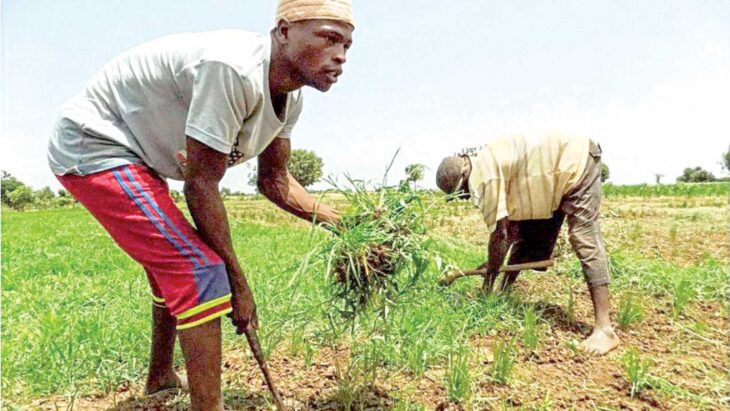Nigeria, with its vast arable land and diverse agricultural potential, should ideally be a thriving hub for agricultural activities. However, the reality paints a different picture. Nigerian farmers face a myriad of challenges that hinder their productivity, profitability, and overall well-being. These challenges range from systemic issues to environmental and socio-economic factors. Let’s delve into some of the pressing problems faced by farmers in Nigeria.
Limited Access to Land and Land Ownership Issues: Land ownership and access remain significant hurdles for farmers in Nigeria. The fragmentation of land holdings due to traditional inheritance systems often leads to small and uneconomical farm sizes. Additionally, land tenure insecurity and disputes contribute to uncertainties in farming activities, discouraging investments in land improvements and long-term planning.
Poor Infrastructure and Limited Access to Markets: Inadequate infrastructure, including roads, storage facilities, and market linkages, poses a significant challenge for farmers. Poor road networks make it difficult to transport produce to markets, leading to post-harvest losses and reduced profitability. The lack of proper storage facilities also exacerbates these losses, especially for perishable goods.
Climate Change and Environmental Degradation: Climate change has become a harsh reality for Nigerian farmers, affecting weather patterns, rainfall distribution, and overall agricultural productivity. Erratic rainfall, prolonged droughts, and flooding events disrupt farming cycles, leading to crop failures and reduced yields. Environmental degradation, including deforestation and soil erosion, further compounds these challenges, affecting soil fertility and agricultural sustainability.
Pests, Diseases, and Poor Crop Management Practices: Pests and diseases pose constant threats to crop yields in Nigeria. Inadequate pest management practices, limited access to quality pesticides, and the spread of resistant pest strains contribute to yield losses. Moreover, poor crop management practices, such as monocropping and improper soil management, lead to soil nutrient depletion and decreased productivity over time.
Limited Access to Finance and Agricultural Inputs: Access to finance remains a major constraint for smallholder farmers in Nigeria. Limited credit facilities, high interest rates, and stringent collateral requirements make it challenging for farmers to invest in modern agricultural inputs, machinery, and technologies. This lack of access hampers productivity improvements and innovation adoption in the agricultural sector.
Policy and Regulatory Challenges: Inconsistent policies, regulatory bottlenecks, and bureaucratic inefficiencies add layers of complexity for Nigerian farmers. Unclear land tenure laws, ambiguous agricultural policies, and inadequate support for agribusiness development hinder investment confidence and long-term planning. Additionally, cumbersome procedures for obtaining permits and licenses create barriers to entry and expansion for farmers and agribusinesses.
Socio-Economic Factors and Rural-Urban Migration: Socio-economic factors, including poverty, lack of education, and limited access to social services, contribute to the vulnerability of farming communities in Nigeria. Many smallholder farmers struggle to access quality education, healthcare, and basic amenities, further perpetuating the cycle of poverty. Rural-urban migration exacerbates labor shortages in rural areas, impacting farm productivity and sustainability.
Addressing the Challenges: Recommendations and Solutions To address these challenges and revitalize the agricultural sector in Nigeria, a multi-faceted approach is required:
Investment in Infrastructure: Improving road networks, storage facilities, and market access can reduce post-harvest losses and enhance market linkages for farmers.
Enhanced Agricultural Extension Services: Providing farmers with access to modern agricultural practices, technologies, and extension services can improve productivity and resilience.
Land Reforms and Tenure Security: Implementing clear land tenure laws, promoting land consolidation, and resolving land ownership disputes can boost agricultural investments and productivity.
Climate-smart Agriculture: Promoting climate-resilient farming practices, water management strategies, and sustainable land use can mitigate the impact of climate change on agriculture.
Access to Finance and Inputs: Facilitating access to affordable credit, agricultural inputs, and modern machinery can empower farmers and stimulate agricultural growth.
Policy Reforms and Governance: Enacting transparent and supportive agricultural policies, streamlining regulatory processes, and fostering a conducive business environment can attract investments and promote agribusiness development.
Rural Development and Poverty Alleviation: Investing in rural infrastructure, education, healthcare, and social services can uplift farming communities and reduce rural-urban migration pressures.
In addressing the challenges faced by Nigerian farmers requires concerted efforts from government agencies, private sector stakeholders, development partners, and civil society organizations. By implementing holistic solutions and fostering an enabling environment for agriculture, Nigeria can unlock its agricultural potential, improve food security, create employment opportunities, and drive sustainable economic growth in rural areas.
In simple terms, if we work together to fix these problems for farmers in Nigeria, it will help them grow more food and make more money. This is good for everyone because it means we’ll have enough food to eat and farmers can have better lives
Follow us now for more news in Oyo State.
Oyo Truth is an independent online news /medium reporting up-to-date events, happenings and activities related to Oyo State, Nigeria.







Leave a Reply